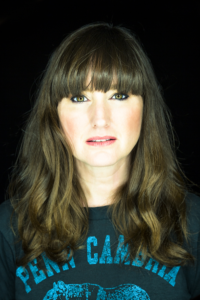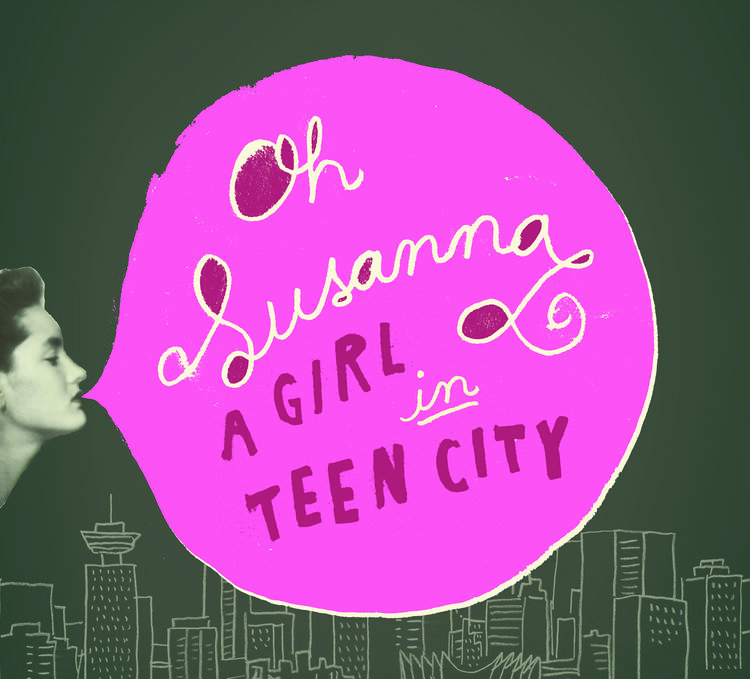When the announcement came out several months that Oh Susanna (the name under which Suzie Ungerleider performs) was releasing a new album this year, we here at Team GDW were hugely excited. We came to her music via her previous project, “Namedropper,” a collection of songs written by other songwriters specifically for the album and made beautiful by Suzie’s fabulous voice and Jim Bryson’s deft production.
With this project, Suzie has turned to her own youth as the fount of inspiration. Working once again with Bryson, she delivers in “A Girl in Teen City” a hauntingly lovely set of songs that will no doubt find echoes in your own memories, if (like me) you grew up in the 1970s and 1980s. Mining those long-ago feelings of not quite fitting in, of exploring boundaries, of taking risks with all the courage of fearless youth, she has delivered an album that, to me at least, ranks up with her best work and steps into new, vulnerable (and brave) territory.
Suzie was one of the first people to follow Great Dark Wonder on Twitter (for which we are so grateful!), so we are absolutely delighted that we had the chance to talk with her about “A Girl in Teen City.”
I feel like I had a comparatively dull youth after listening to the album, but even so, I’m not sure I’d have the courage to write about it. Is it challenging to write songs that draw, at least in part, from your own story and reveal something of yourself to the audience?
It is challenging to write about my life and I think it is why I took so long to do it. Revealing myself is a life-long challenge for me. I have two very different sides to me: I have a very strong personality and perspective and yet I am hesitant or afraid at times to express it. So, I used the persona of Oh Susanna to serve as a mask to feel safer to say certain things. Also, traditionally I wrote songs in the voice of other people. Here I am still using teenage self as a character in the story, so it isn’t me right now, but maybe that is the next step!
When I listened to “My Boyfriend,” all the times I’ve felt as though I could do something as well as (or better than) the other people in the room came back to me. I suspect a lot of women have had that experience. How hard is it to speak up from your corner, so to speak, and promote yourself, your music, and your creativity to others? What advice might you give to those who maybe haven’t had that courage yet?
I find it really hard to promote myself without feeling cringy or embarrassed about it. I think part of that is also the fact that Canadians value humility and understatement. In the USA, blowing your own horn is expected and encouraged, ambition is valued and upheld as a virtue. Here in Canada we really have a problem with that. I was born into an American family so I also have a bit of a split personality in this regard.
As a woman, I also feel like it is hard not to apologize or downplay my achievements and skills. As an artist that is the case as well….we are fragile because most of us struggle with financial security and therefore our success isn’t really measured in accordance with getting rich or famous…but that always hovers over most of us who work in the arts. I think that there is a difference between confidently owning your talents and being egotistical but these get conflated in my mind at times. I am working on it though. Maybe this is why I wrote about this teenage time in my life which is about search for identity. My advice is that you can own your skills and talents and at the same time not be an asshole. True confidence is generous. Try not to erase yourself or others.
You raised funding for this project through Kickstarter. How was that experience for you? Would you do it again?
Fundraising through Kickstarter can be amazing but also exhausting. It is really lovely to have that support from friends and fans where they are saying “yes we want you to keep creating!” It is also a wonderful marketing opportunity to let people know that you are working on something and they can help make it happen. It feels like a direct communication between me and the people who listen to my music and I love that. It was especially emotional the last time when I got diagnosed with cancer and had to tell a few hundred people about it because it delayed the release of “Namedropper.” That was hard, but of course then I had more love and support coming from them. The thing that is hard is trying to sell yourself and your product to people and to not feel like you are annoying them or begging. I question if I am going to do it again for the next album because of this. I also don’t want people to feel like I am asking for a hand out every few years.
What, if anything, has writing these songs about your youth and reflecting on what came before given you insights into where you are now and where you see yourself heading in life?
I feel like writing these songs and reflecting on these times made me realize that I have had an interesting life and that the search for who I am is still in process. I also feel like I could learn from that teenage self…she had guts in some areas…more politically active, more willing to have fun and be spontaneous and deliberately break the rules. I also know I wouldn’t want to be a teenager again. It was painful at times and we felt very trapped. But out of that pain or sense of frustration we did act and create and made friends. I also know that this record is really a way of immortalizing that time in case my illness returns and I don’t survive it.

Hearing “Puget Sound” and reading your description of it on the CBC Music website, I laugh a little, because for me Canada represented the magical escape from a very dull Midwestern American existence as a teenager – the exact opposite of your experience of it. What is it about that “grass greener on the other side” feeling that so many of us feel, do you think?
Oh yes, escaping one’s normal life and surroundings is so important. I think as a traveling musician this feeling that other places are more interesting is one day confirmed and the next day totally undermined. It is a cliché but everywhere you go, there you are. You can’t escape yourself so easily. I do think though that this is what makes the movement of traveling so addicting, you can get out of your head and see other perspectives. It is also a great feeling to finally miss home.
Your son, Salvador, shares writing credits on “Flashlights.” How did that come about – has he always gravitated to music and writing?
My son loves music. He is a natural drummer and has been drumming since before he could walk. He is eleven now. He has always wanted to define himself as a unique person, distinct from me or his dad, so his preferred medium is film, animation or drawing. He likes to use GarageBand to arrange songs and instrumental music that he imagines would be used in film or video games. With that song, he asked me to play some chords on the ukulele, he recorded it and then put a drum track to it. I then wrote the melody and our friend played it on the piano. Then that morphed into the song Flashlights. The song wouldn’t exist if he hadn’t asked me to do that so I gave him deserved credit on the song.
Your musical career now spans some twenty years – how has the business, and your experience of it, changed in that time?
Absolutely! Well maybe it has changed and maybe it hasn’t. I think that when I started Ani DiFranco was at the top of her game and there was enormous hope for being an independent musician. That hope certainly has diminished as fewer people see live music and buy music. What hasn’t changed is the amount of money a musician makes or a band gets paid! Ask any side musician and they will tell you that unless they are working for a really famous band, they are getting paid the same or less than what they were making 20 years ago. I don’t know if the general public realizes this. It is hard to talk about because then we sound like we are unsuccessful, whining or entitled. The fact is, however, that when Google and YouTube makes billions of dollars off of content they get for free there is something really wrong.
I am hoping that legislation will be put into place that helps content providers (i.e. the artists) receive higher royalties. Also, people should know that whenever they pay for music either by paying for their streaming service, buying downloads, CDs, vinyl, or for tickets to a show, it really makes a big difference. The other really helpful thing people can do to support the music they love is to tell their friends about it. This is how we can keep going in a public way. Otherwise more of us will just make music for our own self-expression rather than for public consumption because we are busy working day jobs or unable to pay for the recording and marketing that it takes to be heard.
~ L
Photo credit: Heather Pollock
Listen to “A Girl in Teen City” on Spotify and then buy it online on her website. (Note: as Suzie mentions above, you can support her and all the other artists you love by subscribing to Spotify or a similar service, saving their albums to your collection, and/or buying the downloads or CD from their websites.)


